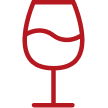Giannikos Winery - Artuke
Artuke is a small family winery, founded by father Miguel Blanco in 1991 and for about 10 years now with the help of sons Arturo and Kike (together 'Artuke'). Together they cultivate 22 hectares, spread over 32 different plots, some of which are top crus. They are also the forerunners of the Rioja'n Roll movement that saw the light in this area a few years ago.
Young winemakers from Rioja worked together with the same philosophy; Terroir wines are made in a natural way, without fuss, and with respect for their region and especially their landscape and their varieties, in the first place Tempranillo, of course, but also other old cépages that are often planted together in the vineyard. Originally from Rioja Alavesa in Baños de Ebro, they also have some nice plots with vieilles vignes in Samaniego and San Vicente de la Sonsierra and even in Abalos in Rioja Alta. For us, they are the pioneers of the new generation in Rioja.
The whole family has its roots in Rioja and in viticulture. Father Miguel Blanco decided in 1991 not to sell his grapes anymore, but to start on his own account. He launched his wines under his own name. The sons were raised on the small family estate and grew up among the vineyards and the bottles. In 2003 Arturo joined the domain and in 2010 the youngest son Kike. The first thing the new generation did was to study the different plots and terroirs their father owned.
All their vineyards were planted in gobelet or 'bushvines', which made them more resistant to drought and extreme climatic conditions. The new vineyards they plant today are also systematically planted in Gobelet. They also decided to adopt the biodynamic practices for their vineyards and, along with a number of other young winemakers, were the forerunners of the innovative Rioja 'n Roll movement. 2016 was the first vintage that they made their wines according to their terroir and divided them into 'premiers crus' (Finca de los Locos and Paso las Mañas) and 'grands crus' (La Condenada and El Escolladero).
In the meantime they still make a young cosechero wine and a 'vin de village', the Pies Negros, from the village of Abalos. Today they are one of the big names for the future in the well-known Rioja region.
Rioja, of course, means Tempranillo, and that is also the main grape variety in their vineyards. They work with a lot of vieilles vignes, which means that on the corners of the plots, and often also between the Tempranillo vines, other grape varieties are often planted. They do not vinify these separately, but believe in their terroir and in the coupage of their terroir. That is why up to 20% of other grape varieties are often used, such as of course Graciano, which is increasingly seen in Rioja, but also Garnacha and Cagazal, a Rioja variant of the well-known Palomino.
In vineyards planted just after the phylloxera, around 1920, the latter is often found to fill the gaps. After all, Palomino was a fast grower with high yields. And in coupage with Tempranillo, these other grape varieties give a nice variety and freshness.
Terroir
Artuke mainly works in Rioja Alavesa. These villages usually have a little more Atlantic influence than Rioja Alta. Their best vineyards are in Baños de Ebro, Samaniego and San Vicente de la Sonsierra. Some nice vineyards also in Abalos, just over the border in Rioja Alta, but below the Sierra Cantabria, so the most Atlantic part of the Rioja Alta.
Abalos: 8 different plots for Pies Negros and 1 plot for the grand cru El Escolladero. Both are mainly lime-clay soils, located between 530 and 600 m altitude.
Samaniego: for 1er cru Paso Las Mañas, lime-clay soil, on a 15% slope from north to south, between 680 and 700 m altitude.
Baños de Ebro: plots for their base wines and for 2 crus:
Finca de los Locos: sandy stony soils on a north-south slope of 3% between 520 and 530 m.
Grand Cru La Condenada: sandy soil with sandstone in the subsoil at 540 m altitude.
Vinification
All plots are biologically farmed and most plots use biodynamic practices. Artuke's wines are sometimes called the most Burgundian of Rioja because of their elegant and fine style. No “power Tempranillo” is made here. All grapes are harvested by hand and brought to the bodega in small baskets. All grapes pass the selection table. These are de-stained and then transported by gravity to stainless steel tanks.
Fermentation takes place with native yeasts. Malolactic fermentation in large wooden foeders. Then an élevage of another 13 to 16 months, depending on the wine, in large wooden casks (between 500 and 3500 litres). The 2 grands crus come in 600 liter foeders.












